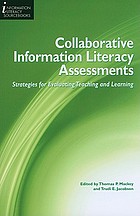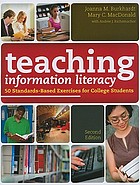 Collaborative Information Literacy Assessments by Thomas P. Mackey; Trudi Jacobson
Collaborative Information Literacy Assessments by Thomas P. Mackey; Trudi Jacobson Teaching Information Literacy by Joanna M. Burkhardt; Mary C. MacDonald
Teaching Information Literacy by Joanna M. Burkhardt; Mary C. MacDonaldInformation literacy is a set of abilities requiring individuals to "recognize when information is needed and have the ability to locate, evaluate, and use effectively the needed information." 1 Information literacy also is increasingly important in the contemporary environment of rapid technological change and proliferating information resources. Because of the escalating complexity of this environment, individuals are faced with diverse, abundant information choices--in their academic studies, in the workplace, and in their personal lives. Information is available through libraries, community resources, special interest organizations, media, and the Internet--and increasingly, information comes to individuals in unfiltered formats, raising questions about its authenticity, validity, and reliability. In addition, information is available through multiple media, including graphical, aural, and textual, and these pose new challenges for individuals in evaluating and understanding it. The uncertain quality and expanding quantity of information pose large challenges for society. The sheer abundance of information will not in itself create a more informed citizenry without a complementary cluster of abilities necessary to use information effectively.
Information literacy forms the basis for lifelong learning. It is common to all disciplines, to all learning environments, and to all levels of education. It enables learners to master content and extend their investigations, become more self-directed, and assume greater control over their own learning. An information literate individual is able to:
This document may be reprinted and distributed for non-commercial and educational purposes only, and not for resale. No resale use may be made of material on this web site at any time. All other rights reserved. © Copyright 1997-2009 American Library Association.
